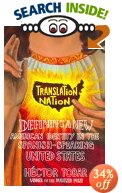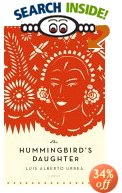Here's some of what I've been devouring of late, in Spanish, English and in several cases a mix of the two:

I just reviewed Killer Crónicas: Bilingual Memories, by Susana Chávez-Silverman, for Cuerpo Magazine, so I won't write that much here except to say that I have never read anything like this book in my life. It is written in a Spanish/English mix that is incredibly fun to read (if you speak both languages -- I'm not sure what it would be like to read this and not be bilingual), but the insights go way beyond fun. It is a true journey of the soul. Read the full review in the upcoming edition of Cuerpo!

Wow, I found this book entirely thanks to el destino; I was looking for another book with "Gringolandia" in the title (recommended by a friend) and came across The Chalupa Rules: A Latino Guide to Gringolandia. Because I am a complete Lotería fanatic, and the book uses Lotería images to tell its story, I had to get it. I'm so glad I did. As I was reading the introductory chapter, I realized that the author, Mario Bósquez, is one of our local TV news anchors, whom I've watched often. All I can say is that after reading that first chapter, I will be looking at him in a completely new light. He describes his story of struggling to make it, of growing up poor, of wearing threadbare jackets on camera as he was establishing his career, of sending every spare penny back home to his family. He credits the love of his family, hard work, determination, persistence, and the wisdom he learned through age-old dichos for his success as the first full-time Chicano television anchor in New York. This is an incredibly inspirational read for adults, and I can really see it as a wonderful book for teenagers as well.

Translation Nation: Defining a New American Identity in the Spanish-Speaking United States arrived in the same shipment as The Chalupa Rules, and I started reading them both at the same time. Héctor Tobar's description of Latino lives in the U.S. traces everything from one individual's border crossing to the Latino community-building that is taking place around the country and changing the culture not only of our larger cities, but more importantly, of many smaller rural and suburban communities as well. This book sends such a positive message about how many parts of our country are not just accepting la nueva onda, but thriving and being rejuvenated through the richness and diversity of the many Latino cultures which have joined their communities. One of my favorite stories is about how the town of Dalton, Georgia handled the influx of Latino children into their schools, with the percentage going from only a handful of Latino kids a decade earlier, to 80% now. I'd like to quote more on this in a later post, but I will just note that there actually are communities that see a need like this, decide to send many of their teachers to Spanish-language classes, the principal herself will go to the very area in Mexico where most of these children come from to learn more about their cultural background, and Spanish and English are heard throughout the school, from both the children and the very Anglo – but newly bilingual – teachers. With all the bad things I keep hearing about education (and seeing some of them myself, as a teacher), this was a truly inspiring story.

The Hummingbird's Daughter, by Luis Alberto Urrea, is a beautiful book about a young girl who has a special gift of healing and becomes an important curandera and partera in the time just before the Mexican revolution. What makes this story unique, for me, is that in addition to being beautifully written and extremely engaging, it is based on a real person – Urrea's great-aunt (his tía abuela, as I just mentioned in a previous post). Urrea's bio notes that this novel "took twenty years of travel, research and study amoung the healers to write." I'd like to read more by Luis Alberto Urrea, and I'm sure I'll be ordering more of his books soon.

OK, this one you need to speak Spanish for, but if you do, buy this book and read it. I have enjoyed Gioconda Belli's powerful poetry, and have read other books of hers, but El pergamino de la seducción is completely different. It's the story of Juana La Loca, the daughter of Ferdinand and Isabel of Spain. I had always heard little bits about Juana La Loca, mainly that she was indeed loca and had a very sad life. This book makes her come alive, and describes the treatment she received at the hands of her parents, her husband, her political advisors, and everyone else who was able to take away her sovereignty, her home, her freedom, her trust, and worst of all, her children, while she could do nothing to prevent it. Belli takes a great deal of poetic license, of course, but she has clearly done her historical research as well... so much so that an in-law of mine, who happens to be distantly related to Juana La Loca and up until now completely bought into the "she was really crazy" party line, may actually be changing his mind a bit now, thanks to this book. Basically, Belli notes that while Juana may indeed have been depressed or bipolar, the abuse, abandonment and imprisonment she suffered at the hands of those she loved and trusted, combined with the callous and forced separation from her children and her few real friends, were certainly enough to make any one of us end up loca.


No comments:
Post a Comment